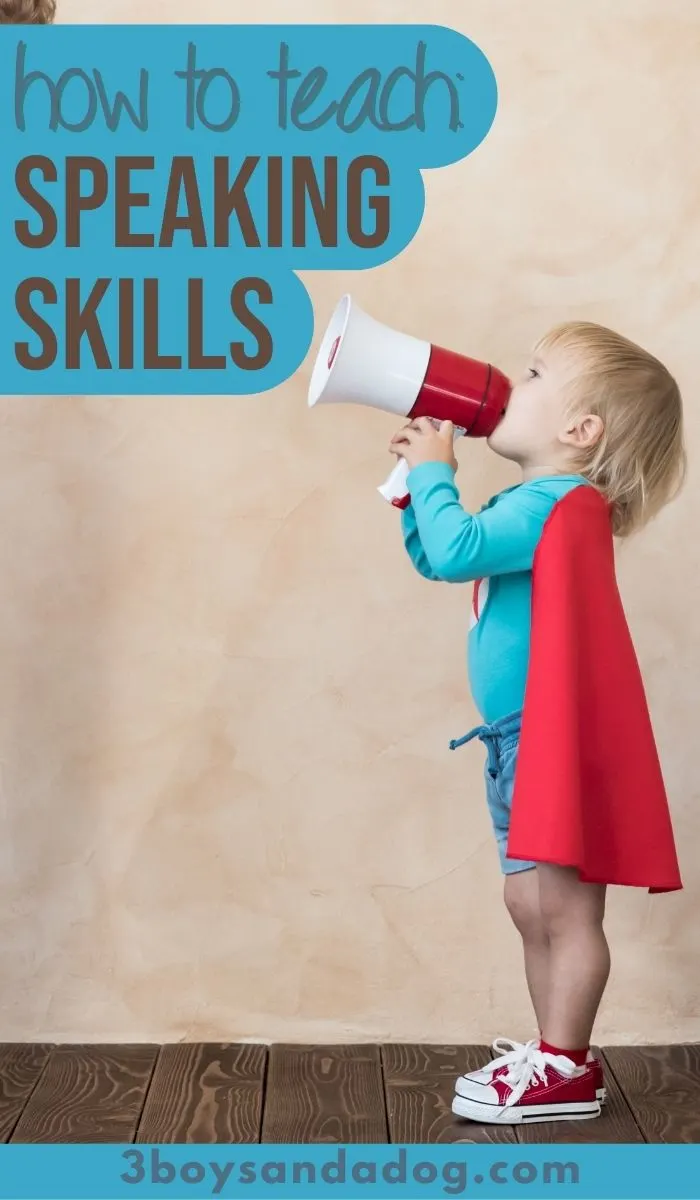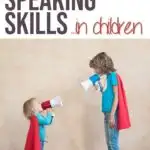One of the most critical milestones for a growing child is developing speaking skills. As parents or teachers, it’s essential to understand that every child has a different pace and style of language acquisition.
Some might start speaking as early as nine months, while others may begin later. As caretakers, it’s our responsibility to encourage and promote the development of this skill.
Children develop their speaking skills through interactions with others. It’s a vital aspect of communication that helps them express their thoughts and feelings, understand and follow instructions, and build relationships.

In this blog, we’ll discuss the importance of speaking skills and tips for teaching and cultivating them in children.
What are Speaking Skills?
Speaking skills refer to the ability to communicate effectively through oral language. It involves using words, tone, and body language to convey a message or express thoughts and feelings.
These skills are crucial for everyday interactions and play a significant role in a child’s cognitive, social, and emotional development.
Speaking skills are the ability to express thoughts, ideas, and emotions through verbal communication. It includes not only the formation of words but also the modulation of tone, pace, and inflection.
It comprises of receptive skills like listening, understanding and responding to spoken words, and expressive skills like speaking and conveying messages.
The Importance of Speaking Skills
The development of a child’s speaking skills is crucial for socialization and cognitive development. Children who are competent in speaking skills find it easier to interact with peers, teachers, and parents.
It also leads to better comprehension skills, higher academic performance, and improved memory retention.
Speaking skills are not only about uttering words. They encompass a broad range of cognitive skills, including critical thinking, problem-solving, and creativity.
Here’s how:
- Critical Thinking: When children engage in conversation or debate, they need to actively listen, process the information, form an opinion, and then articulate it clearly.
This process involves analyzing the information, assessing its validity, and making judgments – all of which are critical thinking skills. Speaking also encourages children to question, seek clarification, and challenge ideas, thereby promoting critical thinking. - Problem-Solving: Effective speaking requires the ability to express thoughts clearly and logically. When children are presented with a problem, they must articulate their understanding of the problem, discuss potential solutions, and explain their choice of solution.
This process of verbalizing their thought process helps develop problem-solving skills. In group discussions or debates, children learn to negotiate, persuade, and collaborate to reach a solution, further honing their problem-solving abilities. - Creativity: Speaking skills can foster creativity by encouraging imaginative thinking. For instance, storytelling activities require children to create characters, plotlines, and narratives, stimulating their creative abilities.
Similarly, role-play activities allow children to think creatively as they adopt different characters and situations. Expressing their ideas verbally helps children think outside the box, experiment with new ideas, and innovate.
Speaking skills are intertwined with cognitive abilities. As children develop their speaking skills, they concurrently enhance their critical thinking, problem-solving, and creative abilities, preparing them for success in various aspects of life.
Children who start developing these skills early on are also more confident and often have a broader perspective on the world.
Activities to Promote Speaking Skills
There are various activities that parents and teachers can use to promote the development of speaking skills. These activities can include playing verbal games, asking open-ended questions, using educational videos, imitation games, and storytime sessions.
It’s important to incorporate physical activities like mimicry, role-play, and drama to make learning fun and interactive.
Playing Verbal Games:
Games like ‘I Spy‘, ’20 Questions’, or even simple word association games can be a fun and engaging way to help children develop their speaking skills.
These games require them to think on their feet, articulate their thoughts clearly, and interact with others verbally.
Asking Open-Ended Questions:
Instead of asking questions that can be answered with a simple ‘yes’ or ‘no’, encourage children to express their thoughts by asking open-ended questions.
For example, instead of asking, “Did you enjoy the movie?” ask, “What did you like about the movie?”
This encourages them to form complete sentences and articulate their thoughts more clearly.
Use of Educational Videos:
Videos can be an excellent tool for teaching speaking skills. Children can watch characters engage in dialogue, learn new vocabulary, and understand the nuances of conversation. They can then practice these skills during discussion sessions post-viewing.
Storytime Sessions:
Reading aloud to children or having them read aloud not only improves their language comprehension but also their speaking skills.
It helps them learn proper pronunciation, sentence structure, and vocabulary.
Physical Activities like Mimicry, Role-Play, and Drama:
These activities make learning fun and interactive. Mimicry helps children understand body language and non-verbal cues, while role-play and drama activities help them learn how to express themselves in different scenarios, improving their verbal communication.
Pretend Play Printables:
The following printables can aid in the mimicry, role-playing, and drama activities:
Using these printables in combination with the activities mentioned earlier can help children develop their speaking skills while having fun and being creative.
So, engage your child in conversation, play some verbal games, or have a storytime session today and watch them become confident communicators!
Remember that promoting speaking skills is not just about developing language abilities but also about fostering critical thinking, problem-solving, and creativity!
These activities should be challenging enough to encourage children to think and articulate their responses.
Shop My Learning Printables:
The following homeschool picks of mine can be found in my shop. Simply click the image that interests you!
Fostering an Environment for Independent Development of Speaking Skills
Children tend to pick up language skills effortlessly. However, as caregivers, we can create an environment that fosters independent development of speaking skills.
An environment with age-appropriate reading material, arts and crafts activities, social interactions with peers, and exposure to different languages and cultures can enhance language acquisition.
- Age-Appropriate Reading Material: Books that are suitable for a child’s age and comprehension level can significantly boost their language acquisition. Picture books help toddlers associate words with images, early reader books introduce new vocabulary and simple sentence structures for preschoolers, while chapter books for older children enhance their understanding of complex language and narratives. Reading aloud to children also aids in developing their listening and speaking skills.
- Art and Craft Activities: These activities offer a creative outlet for children to express their thoughts and ideas. As they describe their creations or the process they followed, they practice using language to convey information effectively. Additionally, following instructions for craft activities can improve their understanding of language structure and syntax.
- Social Interactions with Peers: Playdates, group activities, or simply interacting with peers at school aids language acquisition greatly. Children learn to communicate their thoughts, feelings, and needs effectively, pick up new words and phrases from their peers, and understand the nuances of conversation, like taking turns and listening to others.
- Exposure to Different Languages and Cultures: This broadens a child’s linguistic horizon. Learning a second language can improve cognitive abilities such as problem-solving and critical thinking. Exposure to different cultures can enrich their vocabulary with new words and phrases and enhance their understanding of the world.
By incorporating these elements into a child’s environment, parents and educators can create a rich, immersive learning space that fosters language acquisition and cognitive growth.
Encouraging children’s curiosity, experiments, and research will lead to further development of their language skills.

The development of speaking skills is one of the most crucial milestones for children. It’s essential to establish a supportive environment through fun and interactive activities where children can learn, express themselves, and discover the world with ease.
As caregivers, we should always be patient and encourage children to communicate without fear of being wrong.
With consistent efforts, children will become competent in these skills, building self-confidence, and preparing them for a successful academic and social life ahead.












